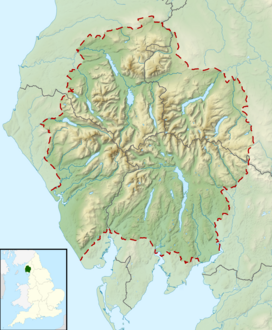Grasmoor
| Grasmoor | |
|---|---|

the Crummock Water valley |
|
| Highest point | |
| Elevation | 852 m (2,795 ft) |
| Prominence | 519 m (1,703 ft) |
| Parent peak | Scafell Pike |
| Listing | Marilyn, Wainwright, Hewitt, Nuttall |
| Coordinates | 54°34′16″N 3°16′45″W / 54.57115°N 3.27918°WCoordinates: 54°34′16″N 3°16′45″W / 54.57115°N 3.27918°W |
| Geography | |
| Location | Cumbria, England |
| Parent range | Lake District, North Western Fells |
| OS grid | NY174203 |
| Topo map | OS Landranger 89, 90, Explorer OL4 |
Grasmoor is a mountain in the north-western part of the Lake District, northern England. It is the highest peak in a group of hills between the villages of Lorton, Braithwaite and Buttermere, and overlooks Crummock Water.
Grasmoor is distinguished by its steep western flank, dropping dramatically to Crummock Water. This face is however not suitable for rock climbers as there is little clean rock, although Alfred Wainwright describes a challenging route up the face in his Pictorial Guides to the Lakeland Fells. To the east the fell is linked to others by Crag Hill and Coledale Hause. Grasmoor is also home to the most extensive scree slopes in the North Western Fells.
Grasmoor takes its name from the Old Norse element grise, meaning wild boar. This element appears in other Lake District place names, including Grisedale Pike and Grizedale Forest.
The North-Western Fells occupy the area between the rivers Derwent and Cocker, a broadly oval swathe of hilly country, elongated on a north–south axis. Two roads cross from east to west, dividing the fells into three convenient groups. The central sector, rising between Whinlatter Pass and Newlands Pass, includes Grasmoor.
The highest ground in the North-Western Fells is an east–west ridge in this central sector, beginning with Grasmoor above Crummock Water and then gradually descending eastwards over Crag Hill, Sail, Scar Crags and Causey Pike. Grasmoor has the greatest elevation, although Crag Hill stands at the hub of the range.
...
Wikipedia

